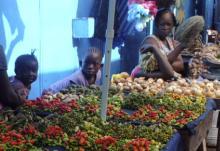
Typical street scene in Santa Ana, El Salvador. (Photo: iStock)
IMF Survey : Liberia Gets $36.5 Million From IMF’s New Trust for Disaster Recovery
February 27, 2015
- IMF Executive Board releases first grant funding from new trust
- Board also frees $45.6 million loan payout as urgent financing for Liberia
- Ebola having deeper, stronger impact on Liberia than first anticipated
The IMF Executive Board approved $36.5 million in debt relief to Liberia in the form of a grant from a newly established trust set up to help low-income countries recover from natural disasters.

Food stall in Monrovia, Liberia, where effects of Ebola outbreak on vulnerable groups include rising poverty and food insecurity (photo: Reuters/Corbis)
RESOURCES TO FIGHT EBOLA
The IMF said the move aimed to enhance Liberia’s international reserves and meet urgent balance of payments and fiscal needs resulting from the Ebola crisis.
The Board also approved a $45.6 million loan to Liberia under the Rapid Credit Facility, a lending arrangement that provides rapid financial support in a single, up-front payout for low-income countries facing urgent financing needs.
The debt relief and the urgent financial support together are expected to improve Liberia’s reserve buildup to meet market demand for foreign exchange, and to act as a catalyst for additional grant financing for the country from other official and private sources.
The package of IMF financing for Liberia draws on $100 million in debt relief funded by IMF grants, announced earlier this month. The debt relief follows $130 million in emergency assistance the IMF disbursed in September 2014 to the African countries worst hit by the Ebola outbreak—Guinea, Liberia, and Sierra Leone.
On February 11 the IMF Board approved release of $25.9 million to Guinea under the West African country’s existing IMF-backed program, and boosted financing under the program by an extra $37.7 million, also to help combat Ebola.
Grants to fight disasters
The new Catastrophe Containment and Relief Trust is a permanent feature in the IMF tool kit. It makes available grants to provide debt relief to eligible low-income countries recovering from a catastrophic natural disaster or seeking to contain the potentially catastrophic spread of a life-threatening epidemic within and across international borders.
The debt relief initiative and additional lending to the Ebola-hit countries were outlined by IMF Managing Director Christine Lagarde in November 2014 in Brisbane, Australia to heads of state of the G-20 group of advanced and emerging economies. This is the first time that the IMF has provided grants to support a country in containing an evolving natural disaster with international spillover effects.
An IMF statement noted that the Board had approved in September 2014 an ad hoc release of an additional $49 million in emergency financial assistance to Liberia under its three-year Extended Credit Facility loan of $79.9 million approved in November 2012. This payout took total funds available under the loan to about $130 million.
IMF staff said in a report that Liberia’s economy is projected to shrink by 1.4 percent in 2015 after barely growing in 2014. The country’s main short-term policy challenge is containing the Ebola outbreak, which is having a deeper and stronger impact than previously anticipated.
Costs of Ebola
The fiscal deficit is expanding to meet spending priorities associated with the epidemic. The budget for the fiscal year 2015 incorporates revenue losses and spending needs of about $200 million related to the Ebola outbreak, and donor financing is helping to finance the wider fiscal deficit.
The outbreak’s potentially long-lasting effects are being compounded by the decline in global commodity prices. The report said the poor and vulnerable population groups are being disproportionately affected by the epidemic, and called for deployment of emergency safety nets to address rising poverty and food insecurity.
Incidence of new Ebola cases has declined recently but eradication will require more time and additional donor resources, the report stated. Liberia’s significant external and fiscal financing needs should be covered by grants to avoid worsening the country’s debt burden.


